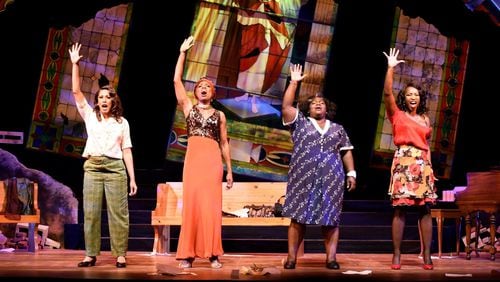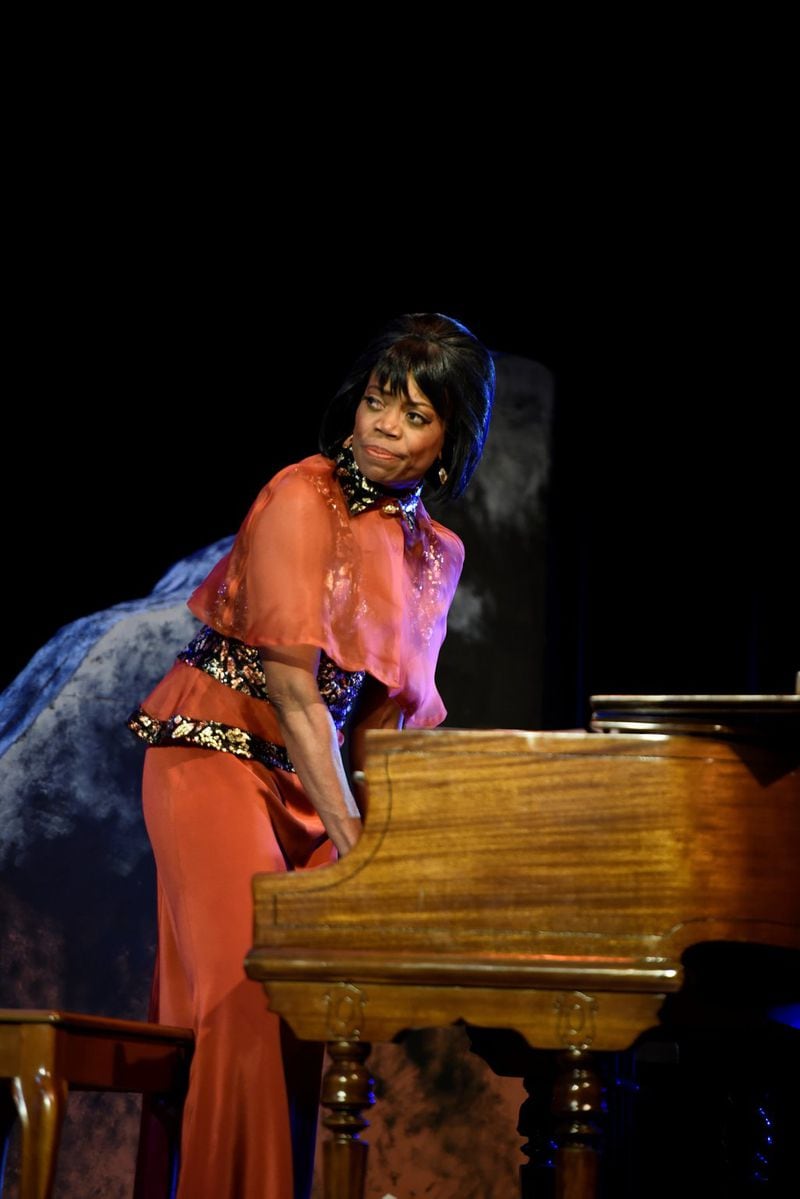Nina Simone, the powerhouse diva who performed scorching civil rights protest songs, was fierce yet flawed, at once powerfully self-possessed and yet torn by her insecurities. As portrayed in Christina Ham's play, "Nina Simone: Four Women," she was also a comic lightning bolt, deliciously full of herself — insufferable.
Directed by Michele Shay and running at Kenny Leon’s True Colors Theatre through Oct. 21, the play imagines the indelible Simone, in all her glory and sass, as she navigates the aftermath of the 16th Street Baptist Church bombing that killed four young black girls in Birmingham, Ala., in 1963.
What was going on in her head as she wrote her signature song “Four Women”? Quite a bit, it appears. Through the course of the one-act play, Aunt Sarah, Sephronia, Sweet Thing and Peaches slowly crawl from the rubble.
>> RELATED: Kenny Leon stepping away from True Colors Theatre Company
As the show begins, we witness Simone (played to the hilt by Regina Marie Williams) performing “I Loves You Porgy,” a song that expresses the white man’s view of the black predicament. If the lyrics give you pause, it’s because Simone, with typical aplomb, has dared to correct the Gershwins’ grammar to “I Love You Porgy.”
Angered and agitated by the racial degradation and hate crimes that plagued her time, using her voice as an artist to articulate her social frustrations, she sought to bring dignity to black people.
Ham’s play is set up to make powerful statements about resistance, about status, and about how black women view themselves in the world. Society, it seems, views them as ugly, and the message has stuck: It’s what they see in the mirror.
Despite all that, and the fact that the show gets off to a slow start, the production is ultimately entertaining; the vocals strong; the choreography (by Dawn Axam) powerful and affecting. (Set designer Kat Conley creates a shattered church that is still somehow beautiful; Fontella Boone’s costumes are right for the period and the personalities.)
In using the conceit of four women, Ham gives us much to ponder.
Do Aunt Sarah (Adrienne Reynolds), Sephronia (Wendy Fox Williams), Sweet Thing (Jordan Frazier), and Simone (as Peaches) represent the adult versions of the four young Alabama martyrs, had they been allowed to grow up? Are they just four emblematic black women — described by their author as black, yellow, tan and brown — in confrontation with themselves and their place in society?
As drawn by Ham, they come across more as stock figures than fully articulated human beings with rich and complicated stories. They are angry and uncomfortable with the stereotypes that society (and, alas, the playwright) foist upon them. Too often, these rather predictable character studies turn into caricatures. Eyes roll. One-liners emerge, and the comedy comes across as a bitchy cat fight. Who can outdiss who?
Of course, it would be hard to imagine a play about Simone any other way.
Regina Marie Williams is a wonderful actress, though her glamorous, scenery-chomping Simone is a little more Diana Ross and Eartha Kitt than the North Carolina preacher’s daughter born Eunice Kathleen Waymon in 1933. Reynolds is funny and does her best with the lightweight material. The problem with a structure that has characters dropping in one by one is that it shortens our time together. We know less of Sephronia than the women who precede her. Sweet Thing feels like an afterthought.
There’s also a good bit of directorial clunkiness. When songs begin, Simone appears to play piano, but when she moves away from the instrument, the music continues magically. That would be musical director Christian Magby, performing offstage. In the program, Magby’s character is called Sam, but I had to read the script to understand that Sam was Simone’s brother. All that said, Magby, whom I’ve only previously seen onstage as an actor, is very talented.
By the end, the tensions do dissolve into a feeling of peace, though I couldn’t tell you exactly what has transpired to cause this, except that Simone has finally nailed her song.
But when these actors sing and dance (“Mississippi Goddam,” Ham’s mesmerizing “Shout Oh, Mary”), they channel the soul of an artist who had something to say about the price of “black-ness.” At such moments, with every fiber of their being, these women are free from trouble, pain, ugliness and hate. And we are transported with them.
THEATER REVIEW
“Nina Simone: Four Women”
Through Oct. 21. 7:30 p.m. Wednesdays-Saturdays; 2:30 p.m. Saturdays and Sundays; 11 a.m. Wednesdays (Oct. 10 and 17). Tickets start at $25. True Colors Theatre, Southwest Arts Center, 915 New Hope Road SW, Atlanta. 1-877-725-8849, truecolorstheatre.org.
Bottom line: Uneven writing; solid music-making and dance.
IN OTHER NEWS:
About the Author







